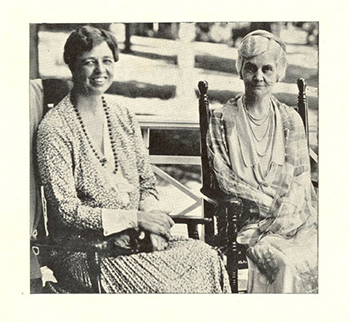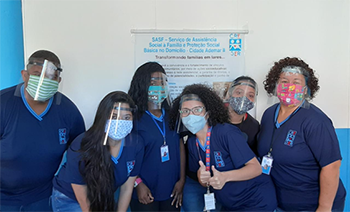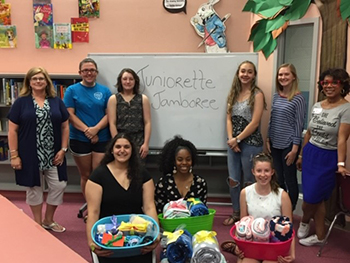|
May 28, 2020
View our Important Dates page for upcoming events and milestones.
Suffrage at 100: The GFWC Clubwoman as Suffragist

In 1914, GFWC threw the weight of its millions of clubwomen behind the American suffrage movement. Their endorsement of the 19th Amendment helped to lend credibility and momentum to a movement that had been stalling just a few years earlier. Clubwomen across the country marched, protested, and advocated to help ensure the ratification of the 19th Amendment in 1920.
Learn about a few of GFWC’s most illustrious advocates for the vote below!
Julia Ward Howe
Born in New York City in 1819, Julia Ward Howe became one of the 19th century’s most influential women. A writer, abolitionist, suffragist, lecturer, and clubwoman, Julia Ward Howe surrounded herself with notable writers and creators from a young age.
In 1862, Howe’s poem “The Battle Hymn of the Republic” was published for the first time in Atlantic Monthly. Battle Hymn is still considered the Civil War anthem of the Union and is Howe’s best-known publication. After the war, Howe helped to establish and lead major women’s organizations, including GFWC. Other groups Howe helped to establish include the New England Suffrage Association, the Massachusetts Woman Suffrage Association, and the National Woman Suffrage Association.
Eva Perry Moore
Eva Perry Moore dedicated her life to club work and the advancement of women. Moore was a charter member of the Wednesday Club in St. Louis and served as its president from 1892–1894. Moore also served as the Missouri Federation of Women’s Clubs’ President from 1901–1906, and as GFWC International President from 1908–1912. Additionally, Moore served as President of the Association of Collegiate Alumnae, which later became the AAUW, and of the National Council of Women. As GFWC President, she focused on education, public health, and children’s issues.Moore also used her position as a leader in women’s issues to advocate for suffrage. In 1906, as president of the Association of Collegiate Alumni, Moore spoke at the National American Woman Suffrage Association convention alongside Susan B. Anthony. At the Convention she insisted that ‘We have no platform unless it is the care of women and children, and the home, the latter meaning the four walls of the city as well as the four walls of brick and mortar.”
Anna Pennybacker
Anna Pennybacker, who is pictured abive sitting beside Eleanor Roosevelt, was an accomplished suffragist, educator, author, peace activist, and clubwoman. Born in Virginia, Pennybacker moved to Texas at an early age where she had an indelible impact on Texas history and education.
Pennybacker worked as a teacher in Texas and published A New History of Texas in 1888. The textbook was used in state curriculums for over forty years. In 1894, Pennybacker established the Tyler Woman’s Club, one of Texas’s first clubs. From 1901–1903 Anna led the Texas Federation of Women’s Clubs, and from 1912–1916 she served as President of GFWC.
Pennybacker lectured extensively throughout Texas to promote women’s education and suffrage. From 1919–1920 Pennybacker also served as an associate member of the Democratic National Committee, where she formed an influential and lifelong friendship with First Lady Eleanor Roosevelt.
Cares & Concerns
It is with great sadness that GFWC announces the passing of the following GFWC Past State Presidents:
GFWC New Mexico Past President, Elaine House (1974–1976). Condolences may be sent to 1400 Indiana St. NE, Albuquerque, NM 87110. Please keep Elaine’s family in your thoughts.
GFWC New Mexico Past President, Ann Langlinas (1980–1982). Please keep Ann’s family in your thoughts.
GFWC New Hampshire Past President, Carol Waters’ (2012–2014) husband, Denny Waters. Condolences may be sent to Carol at P.O. Box 1073, Exeter, NH 03833. Please keep Carol and her family in your thoughts.
GFWC Montana Past President, Evelyn Casterline (1986–1988). Evelyn was also GFWC Health Department Chairman (1988-1990). Please keep Evelyn’s family in your thoughts.
GFWC Texas Past President, Majorie C. Williamson (2008–2010). Please keep Majorie’s family in your thoughts.
Volunteers in Action

This week’s GFWC Blog features GFWC International Affiliate, CrêSer in Brazil. Read and comment on their activities providing supplies and shelter to families in need during the COVID-19 pandemic.
Have a success story to tell? Share it with us by emailing pr@gfwc.org.
Curator’s Corner
Poetry, Literacy, Activism, and the Suffrage Movement
In 1868, Jane Cunningham Croly, a journalist and future founder of GFWC, organized Sorosis. The new club was established as a refuge for women to openly discuss intellectual ideas, literature, and their own pieces of writing. In the mid-19th century, the act of women writing and gathering for professional purposes was a radical action.
That same year, Susan B. Anthony began publication of The Revolution, the first newspaper in the country dedicated to women’s suffrage. By 1890, the year of GFWC’s founding, another 33 suffrage newspapers were in print. Much like how Jane Cunningham Croly used her own newspaper columns, the act of writing gave suffragists a base to disseminate their ideas and grow their base. However, this was not just limited to journalistic writing. Suffragists used poetry and fiction to propagate their message and help to intertwine it into popular culture.
Suffragists used popular forms of literature, such as poetry, to forward their political campaign through humor and empowerment. Avenues such as this book of suffrage nursery rhymes granted them space to enter popular culture, express their views, and even mock male authority. Other poems, such as Charlotte Perkins Gilman’s We As Women sought to embolden and excite fellow suffragists:
“There’s a cry in the air about us–
We hear it, before, behind–
Of the way in which “We, as women,”
Are going to lift mankind!
With our white frocks starched and ruffled,
And our soft hair brushed and curled–
Hats off! For “We, as women,”
Are coming to save the world…”
Suffragists wrote and published their own books of poetry and helped to promote and popularize the movement within the American consciousness. As we celebrate the centennial of the 19th Amendment, let’s also remember to celebrate its enduring legacy of American poetry and literature.
To learn more about GFWC’s poetry collection, visit our online collections.
State Director’s Project: LeAndra N. Ratliff, North Carolina

LeAndra, also North Carolina’s Third Vice President, chose Thriving Children as her special project because of the creativity children possess. Their love for adventure leaves many inspired and hopeful for the future. Clubwomen’s professional and volunteer work with families and children has taught us the importance of ensuring that our future leaders have the skills needed to tackle the problems of tomorrow. It is critical that children, no matter where they live, should have the opportunity to access quality learning environments, outdoor play, healthy foods, and routine medical/mental health care. Clubwomen across the state have learned how ACEs (Adverse Childhood Experiences) and toxic stress impacts brain development and changes the trajectory of a child’s life.
The goal of this project is to create resilient children by connecting them with caring adults and creating a grid of resources across our state which children can plug into and recharge. Clubwomen across the state have implemented or supported existing community programs such as: mentoring, backpack feeding, and reading buddies. Success will be measured by increased academic performance, improved physical health and the overall wellbeing of children across the state. Increasing a community’s awareness and response to toxic stress helps build stronger children who are better equipped to become more stable and resilient adults.
Parliamentary Pointers: Governing Documents
by GFWC Parliamentarian Deen J. Meloro
Federated clubs and states usually have several governing documents. Any group is free to adopt any set of rules it wants, as long as they don’t conflict with federal or state law, or conflict with its existing rules.
A Corporate Charter (also known as Certificate of Incorporation, Articles of Incorporation, Articles of Association, etc.) is a legal document. It gives the name and object of the group, and any other information required by the individual state for incorporation. This document should be drawn up by an attorney and should only be changed if required by law.
According to Robert’s Rules of Order, Newly Revised, “…the Constitution or the Bylaws—or both—of a society are the documents that contain its own basic rules relating principally to itself as an organization, rather than to the parliamentary procedure it follows.” Current practice is that all a group’s rules about itself are found in one document, usually called the Bylaws, but in some cases, may be called the Constitution and Bylaws. The Bylaws should contain all the rules that are considered so important that they cannot be changed without previous notice to the members and a two-thirds vote in the affirmative. These rules cannot be suspended, unless there is a clause in the rule that allows suspension under certain, rare, circumstances.Most organizations have Standing Rules. These rules are about the details of running the group, and they may be added, deleted, or changed at any meeting, without previous notice. Bylaws may state that a “Hostess Committee” exists, but Standing Rules would state what time the Hostess Committee should set up, what they should bring, and other duties, such as handing out nametags.
Be sure your documents are kept up-to-date, and that they are followed.
Marketplace: Seven Grand Initiatives T-Shirt

Our GFWC clubs have been doing an awesome job helping to reach our Seven Grand Initiatives goals! Celebrate the projects that you have already completed in style with the GFWC Seven Grand Initiative T-Shirt. With its extra soft cotton and beautiful colors, this might just become your new favorite shirt! Order one at the GFWC Marketplace; your shipment will be sent as soon as Headquarters is able to reopen.
Unsubscribe from News & Notes
Don’t want to receive News & Notes any longer? Log in to your person profile on the GFWC Member Portal and uncheck “News & Notes” in the list of message types that you are currently receiving.
|